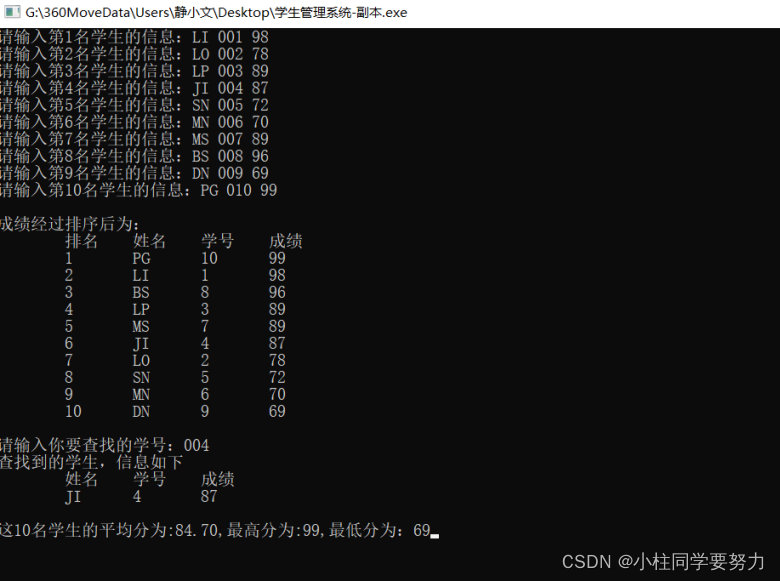仅供借鉴、仅供借鉴、仅供借鉴(整理了一下大一C语言每个章节的练习题、没得题目、只有程序了)
1 、实训名称
实训8:结构体和共用体
2 、实训目的及要求
1、了解结构体,共用体的概念
2、熟练掌握结构体,共用体的定义、赋值、使用。
3 、学会正确使用结构体变量
3、源代码及运行截图
#include<stdlib.h>
#include<stdio.h>
#include<String.h>
#define N 10
struct student{
char name[N];
int score;
int no; //学号
};
void input(struct student stu[N]);//输入函数
void sort(struct student stu[N]);//排序函数
void aver(struct student stu[N]);//求分函数
void locating(struct student stu[N]);//查找函数
void input(struct student stu[N]){
int i;
for(i=0;i<N;i++)
{
printf("请输入第%d名学生的信息:",i+1);
scanf("%s%d%d",&stu[i].name,&stu[i].no,&stu[i].score);
}
}
void sort(struct student stu[N]){ //冒泡排序
int i,k;
struct student temp;
for(k=1;k<N;k++)
for(i=N-1;i>=k;i--)
if(stu[i].score>stu[i-1].score)
{
temp=stu[i];
stu[i]=stu[i-1];
stu[i-1]=temp;
}
printf("\t排名\t姓名\t学号\t成绩\n");
for(i=0;i<N;i++)
{
printf("\t%-8d%-8s%-8d%-8d\n",i+1,stu[i].name,stu[i].no,stu[i].score);
}
}
void aver(struct student stu[N]){
int max=stu[0].score;
int min=stu[0].score;
double average;
int i,sum=0;
for(i=0;i<N;i++)
{
if(stu[i].score>max)
{
max=stu[i].score;
}
}
for(i=0;i<N;i++)
{
if(stu[i].score<min)
{
min=stu[i].score;
}
}
for(i=0;i<N;i++)
{
sum+=stu[i].score;
}
average=sum/10.0;
printf("这10名学生的平均分为:%.2lf,最高分为:%d,最低分为:%d",average,max,min);
}
void locating(struct student stu[N]){
int i,ch;
printf("请输入你要查找的学号:");
scanf("%d",&ch);
for(i=0;i<N;i++)
if(ch==stu[i].no)
{
printf("查找到的学生,信息如下\n");
printf("\t姓名\t学号\t成绩\n");
printf("\t%-8s%-8d%-8d\n",stu[i].name,stu[i].no,stu[i].score);
}
}
int main()
{
int i;
struct student stu[N];
input(stu);
printf("\n成绩经过排序后为:\n");
sort(stu);
printf("\n");
locating(stu);
printf("\n");
aver(stu);
getchar();
getchar();
return 0;
}

4 、小结
通过本次实验,结构体可以存储不同类型的数据。可以将一类事物的相关信息写在一个结构体中便于操作。在对结构体进行赋值时需要用到循环结构。结构体可以当做特殊的数组进行对待,基本的操作和数组相似。





【推荐】国内首个AI IDE,深度理解中文开发场景,立即下载体验Trae
【推荐】编程新体验,更懂你的AI,立即体验豆包MarsCode编程助手
【推荐】抖音旗下AI助手豆包,你的智能百科全书,全免费不限次数
【推荐】轻量又高性能的 SSH 工具 IShell:AI 加持,快人一步
· winform 绘制太阳,地球,月球 运作规律
· TypeScript + Deepseek 打造卜卦网站:技术与玄学的结合
· Manus的开源复刻OpenManus初探
· 写一个简单的SQL生成工具
· AI 智能体引爆开源社区「GitHub 热点速览」